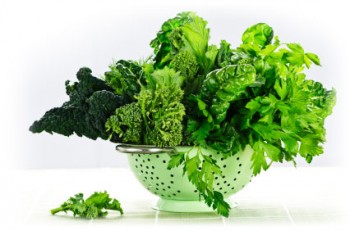Essay: Leafy, Green and Married
It was leafy green and lay in my husband’s plate looking like a graduate of vegetable boot camp. He presented it to me on his twisted metal cafeteria fork. “What is this?”
I was surprised. Spinach in a salad carried the mystique of a slice of American cheese at the deli counter or a common nail in the hardware bin.
A week later, just before Passover, his botanical confusion returned. He asked, “By the way, what is the leafy green plant soaking in a glass of water in the refrigerator?”
Had he never planted parsley as a child growing up in farm country of Indiana? Had he forgotten that parsley was the most popular leafy green of the seder?
I retreated to the internet for help. Googling “brain disorders associated with inability to identify common leafy green vegetables” Wikipedia supplied me with the common and Latin names of over 400 green leafy plants. I was reassured that maybe anyone could get confused with so many green and leafy possibilities. Give him a break, my better self encouraged.
But I was still concerned so I presented my case to a group of friends, many of them in the medical or an associated field and all of them in long-term marriages.
My friend, Joan, offered the opinion I had been unsuccessfully trying on myself: He is a great guy, he has retained his youthful good looks despite being in his sixties, he is a good provider, he got through medical school, how stupid can he be?
“Leave the guy alone and overlook his flaws.”
Yet I still felt angry in the same way I had years before when he asked where we kept the colander. At that time, with two young pasta-loving children, our colander was in constant use, regularly in and out of the cupboard. It was like asking where we kept our toothbrushes.
I could think of only two narratives to explain queries like these:
The first was that despite being a “good guy,” my husband of 26 years was still living under non-feminist misconceptions. He believed names of vegetables and placements of colanders fell in the category “female, domestic,” justifying his expectation that his wife would identify and track these objects.
But I thought I knew better. We had grown up through the feminine mystique. We saw Gloria Steinem together at Barnard. He thought she was amazing. He couldn’t be a sexist because he had no problem with having me for a wife, that woman who railed against limiting stereotypes. A woman who didn’t want to be limited by female roles, or so I thought.
I was the wife who learned how to deal with short circuits and change the oil in her car. He was the husband who patiently stood by and watched me try “guy stuff,” like build a table for our son’s trains and efficiently pack the car for camping junkets. I was the wife who did the tent set-up and all the campfire cooking while he wandered around looking for the coffee filters.
It was I, the liberated woman, who assembled every toy, built every snow-fort and attached every particle board of Ikea furniture. It was he, the husband who ate quiche, looked good in pink and was not ashamed to wear it. I the wife who routinely changed out the smoke detectors, winterized the water system, mowed the lawn. I, the regular handy-woman, cook and mechanic.
Memories flooded me of frustrations using tools I was unpracticed with and lugging heavy awkward boards up our stairs. And worse than that, what if he had taken advantage of my passion for liberating myself from typical female customs? He was just smart enough to let me become the man and the woman of the house. He the liberated husband who was not troubled by the wife who does it all.
Luckily a second narrative occurred to me just as I began to dial 1-800-DIVORCE.
Maybe he really doesn’t know one green leafy vegetable from another and he can’t find the colander. Maybe he has little interest in learning these things, especially if his committed life partner has the knowledge and can perform the tasks. Maybe this was one of the deals we had struck a long time ago, when he earned the hefty paycheck and I took care of everything else.
But what did I get in the end besides calluses and a bloated sense of self-importance? I had learned a new set of skills. I knew I could manage a house on my own should I ever need to do that. I also can light a barbecue, keep a 12 year-old car maintained, run a home-improvement project and navigate online platforms.
How did it benefit our marriage? We had established a mutual dependency and trust based on each of us doing our share based on our authentic interests. He got to depend on me for skills and knowledge he had no interest in proving he knows. I got to rely on his trust in me that I could master even difficult tasks.
Maybe it wasn’t too late to reverse some things and strike another set of deals more equal in sharing the gruesome and boring tasks of life. Maybe he could even learn to recognize spinach from kohlrabi and parsley from kale.
In order to do that, I would have to change. I would have to become less eager to fix everything to demonstrate how strong, knowledgeable and capable I was.
And I would still need my loving and intact marriage to try out my new resolve and push back some. Luckily when he had asked me to identify the leafy green vegetable on the edge of his fork, I had turned to him with my warmest smile, “That is spinach, dearest.”
Curiously, he wasn’t even embarrassed.
- Green, leafy and mysterious


